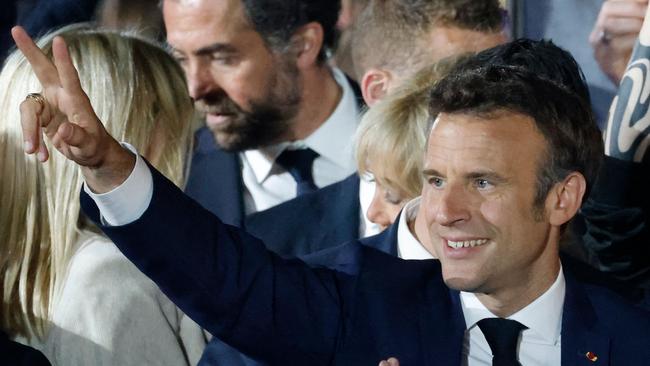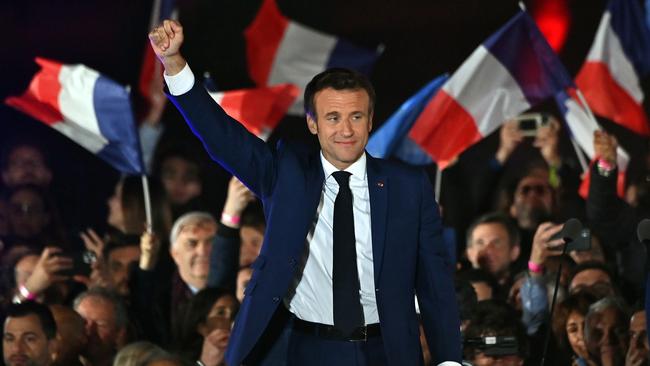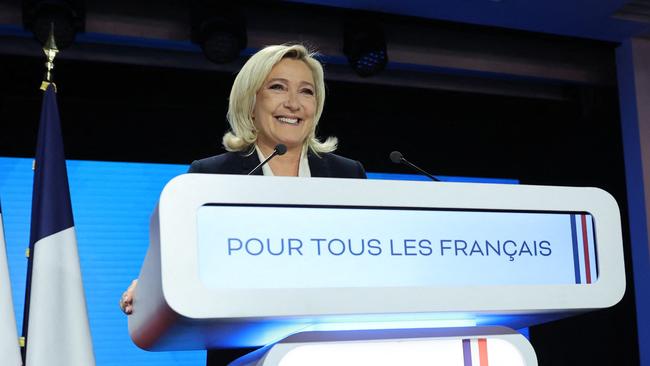Emmanuel Macron beats Marine Le Pen to win second term
At Emmanuel Macron’s low-key election party after he won a second term, most people felt relief, rather than a desire to celebrate wildly.

At Emmanuel Macron’s election party Sunday in the shadow of the Eiffel Tower after he won a second term, the atmosphere was restrained, the victory speech short and most people felt relief, rather than a desire to celebrate wildly.
After a campaign shadowed by the war in Ukraine and with far-right leader Marine Le Pen achieving a historic high score, few seemed in the mood to revel in the French leader’s electoral triumph.
“I think he realises that he wasn’t elected by a huge majority, it was a bit by default,” 25-year-old Pauline Pavan said as the crowd slipped away into the Parisian night.
President Macron had walked slowly to the stage in a park in front of the Eiffel Tower to the sound of the European Union’s anthem “Ode To Joy” by Beethoven, flanked by his wife Brigitte.
His short address was low-key and modest as he acknowledged that many French people had not voted for him, but rather against his rival Le Pen.
Several supporters with loud speakers attempted to rouse the crowd with shouts of “Macron, President!”.
“It was a lot more sombre than in 2017,” said Luca Bouvais, a 20-year-old student, referring to Macron’s initial presidential victory party five years ago, when he triumphed as an outsider in his first ever election.
“I sensed that people were holding back,” he added. “Personally I was expecting a closer result, even that she (Le Pen) could win, so I felt relief above all.” Relief -- “soulagement” in French -- was the word on most people’s lips after Le Pen failed in her third bid for the presidency, but with her highest ever score of 42 percent.
“I’m relieved because I was very worried,” said Jackie Boissard, a 60-year-old bank employee. “He will now need to take into account everyone because there’s too much hatred in the country.”
Macron beats le Pen 58 per cent to 42 per cent
Mr Macron is the first leader in 20 years to secure a second term, beating the right wing candidate Marine Le Pen by a significant margin: 58 per cent to 42 per cent.
The preliminary election results, announced at 8pm when the polls closed, has endorsed Macron’s centrist and pro-European Union policies, and countries like Germany will breathe a sigh of relief that Le Pen’s plan to redraw alliances has failed.
In the first response Clément Beaune, France’s Europe minister and Macron’s close friend, said: “This is a clear victory, the first time in the history of the Fifth Republic that a president has been re-elected when he also has a majority in parliament. It’s important, it’s very important, because this was a political combat, a political combat against the far right.”
This was Le Pen’s third attempt at the presidency, and while she may take heart that the result was closer than Macron’s landslide victory in 2017, there are now big question marks about the leadership of her right wing National Rally party.

Mr Macron only began a serious re-election campaign in the last week’s before the poll, relying on his states craft in negotiating with Russian president Vladimir Putin to try to end the war in Ukraine, and his current presidency of the European Union to reinforce his leadership credentials.
He swept to power in his own La Republique en Marche centrist political party back in 2017 but in the past five years his domestic popularity has dwindled as he is accused of arrogance and being out of touch in his attempts to reform employment laws and retirement age. He has faced strong opposition from the Yellow Vests grassroots movement.
The French result will give Mr Macron impetus to continue with hsi domestic agenda, as well as pursue ambitious plans on the cohesiveness of the European Union, including to have a common European army and a unified Europe approach to reduce reliance on Russian gas and oil imports.
The vote turnout was the lowest on record since 1969, with an estimated 28 per cent of eligible voters deciding not to cast their decision. There were also large numbers of spoiled or blank votes.
Commentators believed that younger people were disillusioned about the voting options, especially when the left wing candidate Jean-Luc Mélenchon was eliminated in the earlier round.

Both Mr Mélenchon and Ms Le Pen have urged for an anti-Macron vote in legislative elections next month.
Mr Mélenchon has argued that he should be the next prime minister and said Ms Le Pen’s defeat was “excellent news”, but that Mr Macron’s win was a “decision by default” amid near record levels of protest voting.
In her concession speech Ms Le Pen said she had no regrets and warned that in the next legislative elections, “we are a party that will take your interests and defend your interests. We will see you at the next battle.”
She added: “I would like to say to all those who wanted to see our party disappear, I would just like to say that I see a new form of hope.”
European leaders sent Macron hearty congratulations.
German chancellor Olaf Scholz said France “sent a strong commitment to Europe” while European Council President Charles Michel tweeted: ”We can count on France for five more years.”
British prime minister Boris Johnson hailed France as one of Britain’s closest and most important allies.
“I look forward to continuing to work together on the issues which matter most to our two countries and to the world,” Johnson said.
Dutch prime minister Mark Rutte said “I look forward to continuing our extensive and constructive co-operation within the EU and NATO, and to further strengthening the excellent relationship between our countries”.



